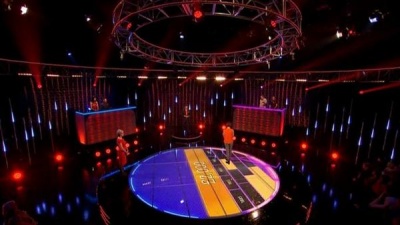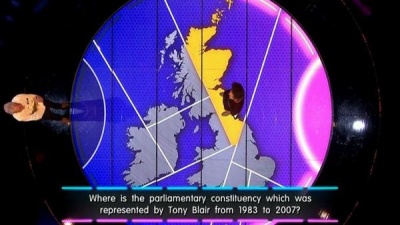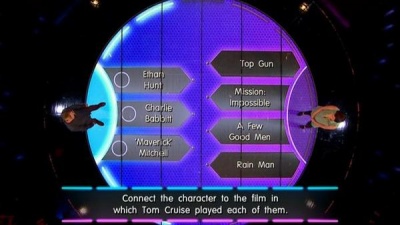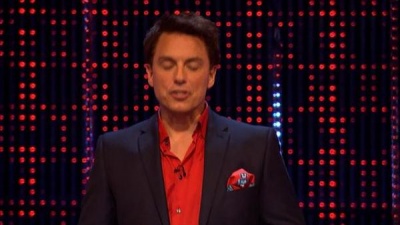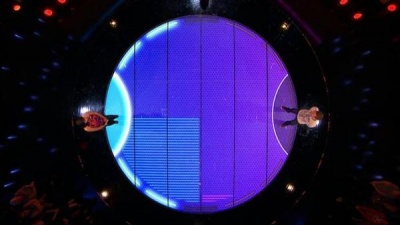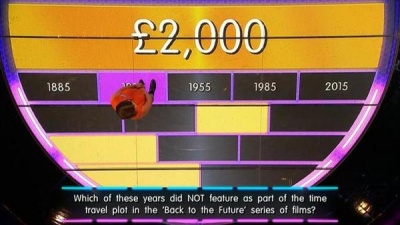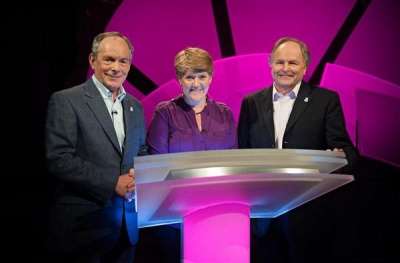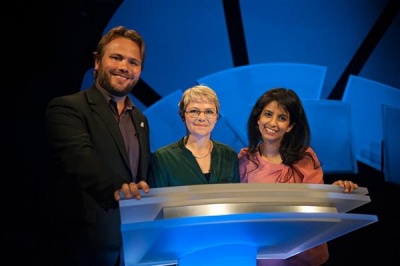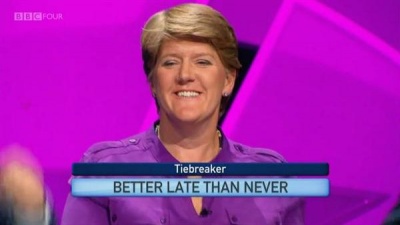Weaver's Week 2013-11-17
Last week | Weaver's Week Index | Next week
Two years ago, the Week discussed 2.8 Hours Later, a zombie chase game in London. Last year, other people's videos featured as part of our DIY Media strand. This year, we've done something ourselves, and a special audio feature presentation will be published by the Fifty 50 Show tomorrow.
But that is tomorrow. What are we going to write about today?
Contents |
Pressure Pad
12 Yard for BBC1, from 4 November
Two teams of five. Four rounds building up to an all-or-nothing final. One gimmick flogged throughout the programme. It's a very 12 Yard programme, this.
The teams are five chums – work colleagues, school friends, an extended family. The same sort of team that might appear on Eggheads, though they'll only have to face another team of mortals, and not the seven-headed beast of knowledge. The teams can be mixed, so it's not quite a return to Friends Like These.
The gimmick is the Pressure Pad, a large circular display screen in the floor of the set. All of the games will take place in and on this arena. We think the set design is intended to resemble a Roman amphitheatre, but doesn't quite get there because the walls are too small. They could have borrowed the God Pod from In It to Win It, and put the non-playing team up in there. Let them be spectators, clearly not influencing action.
Host for this programme is John Barrowman. He's one of those people who a lot of people like, but who leaves this column cold. Probably because we remember him being the fourth wheel on Live and Kicking back in the day, upstaged by Andi and Emma and also by the cartoon puppet Ratz. Putting that aside, Barrowman has always been utterly professional, he brings something to any show he's involved in, and here his people skills do enhance the programme.
Most of the show is taken up with four elimination rounds. The players are told the title of the round, and select one of their number to play the game. The team captain is playing in the final round and won't play earlier, and winners of an earlier round can't play again. Once the teams have nominated their players, and there's been some brief banter between host and player, Barrowman has a toss. Literally: he whips out a coin (one face blue, one face pink), tosses it, and gives the choice of whether to go first or second to the team showing.
The show stands or falls on the strength of these elimination games. All are played as best-of-three, all are designed to take about eight minutes to play if they go to their full length. As they occupy the majority of the programme, we'll discuss each individually.
Borderline. A map of Britain and Ireland is shown on the pad, initially split into three sections. John will ask a question to which the answer is a location, and the player needs to stand on the correct part of the map. The question "where are we filming?" might initially be answered by the section containing the whole of Scotland, but players will later need to know exactly where Glasgow is. This simply wouldn't work without the visual display. We're not sure whether there's an advantage to playing first or second; both players will keep pushing on, usually the fourth or fifth question is decisive.
Connection. Three responses and four possible answers are displayed. Each of the responses will link to a possible answer to complete a question. The player is to pick a response and ensure the connection is made to the correct answer; after this, the response and answer are replaced with new ones. For instance, the responses might be Andy Murray, Jade Jones, and Mo Farah, and the answers various types of sport. Though the pad isn't used for much more than display purposes, it does look awfully good on screen. Difficulty ramps up slowly during the round, it's likely to be advantageous to pick the category and go first.
Deadline. Beware of Darryn Lyons' haircut. The pad is split into half by a white line. John asks general knowledge questions to one of the players: while he's asking, the white line moves towards that player. Only by giving a correct answer will play – and the direction of travel – reverse. The line speeds up as each battle continues, and later games in the round are played to a shorter time limit. The pad is used to good advantage here, we can see who is winning and who is losing very easily, much more so than on Grand Slam. A very clear advantage in going second.
Divider. Turning to the next section, we see the circular Pressure Pad is split into a pie chart with three sections. For instance, 3795, 5200, 8114, which we're told is the number of runs scored in Tests by Geoff Boycott, The Amazing Ian Botham, and Freddie Flintoff. Which number is Boycott's total? Even if the contestant doesn't know, it's a one-in-three choice, and often they can eliminate one of the answers to make it a coin flip. No tremendous need for the pad, and fewer questions by going second.
One Direction. Every show needs its own Harry Styles, and here's John's chance to look dapper and dashing. The players are given four things (for instance, belt, beret, blazer, brogues) and an order they're to put them in. First player to make an error loses. Is this the best round ever? Er, no: it uses the pad as a glorified wall display, nothing that couldn't be achieved by a flipchart and some marker pens. There's no choice of category, and a high error rate, so the advantage is to go second.
Orbit. Four categories are chosen by the producers, and players are to get one question right in each category. The first player sets a time for the second player to beat. The questions in each category get easier as they go on. There's no need for this to be done on the pad, it's another that could be done with paper and pen; nor is there an obvious reason to go first or second.
Radar. Who wins? Bet now! After choosing a category, the players are asked a question with lots of answers (for instance, any football club to have won the European Cup since 1955). The players have about four seconds to give their answer, and there's a similar time for John to judge whether they're right or wrong. This round works like the tie-break on Who Dares Wins, except that the first error loses, and it's timed. So not much like Nick's show, really. There are categories involved, and we reckon that the choice outweighs the lack of thinking time from giving the second answer. Visually, this looks good.
Right On. Eight possible responses to a question appear on the pad. Initially, about five of them are correct and the others are wrong. The player is to stand on an answer they believe is correct; if so, it'll be replaced and the other player has a go. Correct answers won't always be replaced with correct answers. There's only five seconds to move to the correct answer, which introduces some frustration with slow players. It's almost certainly best to go first, there are usually some very obvious right answers to begin with.
Selector. On the radio at this time is Steve Wright In The Afternoon, a programme repeated from 1981. There's something better on the telly. After choosing a category, the players are shown six possible responses to a question. They are given ten seconds to stand on the response, and answer the question. For instance, the category might be geography, the responses "Germany, Norway, Albania, Poland, Portugal, Algeria", and the question, "What's the capital city of this country?" Correct responses are replaced by ones more difficult, ramping up the difficulty as the round continues and forcing a result. The player going first chooses the category, and we reckon they have an advantage in the game.
Time Out. John is listing six items, and the player is to give the specific thing that links them. For instance, "Germaine Greer, Hugh Jackman, Jason Donovan" were all born in Australia. The pad is split into two halves, and the colour drains from these halves while John reads his listings, stopping only when he hears a correct answer. Whoever's colour drains first loses the battle. There's no real need for this to be done on the pad rather than a back-projection display. There are fairly loose categories, and it may be better to pass than play.
There are ten of these games, enough for each show to be mostly different from the last, few enough for the audience to get used to them over the course of a couple of weeks. It's enough for the initial four-week run, but some of these games are going to get tedious quickly. If there's to be a second series, we'd expect to see some new challenges introduced.
So, after about half an hour, we're reduced to the captains and four supporting players – losers in these head-to-head rounds have been sent out of the studio to find a decent sandwich shop (the BBC canteen doesn't count, and no crossing the Clyde). The captains now play in the final round, looking to answer four multiple-choice questions. These questions have two, three, four, and five options, and the captain is allowed and encouraged to confer with the remaining members of the team. Whoever did better in the main game gets to play first here, and they'll continue playing until they make an error.
The unusual feature is that, when a captain gives an incorrect answer, that answer disappears and the question remains. So a choice of five possible answers becomes a choice of four, and eventually a choice of one answer. Unlikely, but it has happened. What we're less pleased to see is how the questions in this round go easy – easy – fairly easy – really hard. We'd like to see play pass back and forth somewhat more than it does.
For the winning captain, the game is not over. They're able to gamble the £2000 winnings on one last question, worth a jackpot that increases at £1000 per day. Choose the correct answer from six possibilities, the team will win; give a wrong answer, both sides leave with nothing. The captain cannot confer with their team-mates. Players sent out for a sandwich aren't brought back for this endgame (trust us, there is nowhere to eat south of the river for a mile around Pacific Quay). When the captain is alone in the studio, there cannot be any reaction shots, no focus-pulls from team to captain.
Overall, we're left feeling that this is a perfectly competent programme, nothing special, nothing wrong with it. John Barrowman hosts professionally, there are occasional glimpses of the show looking good, but only the map round brings much new to proceedings. The general knowledge questions are particularly conservative and insipid (where was Dad's Army set?), and draw from a predictable pool of knowledge (geography or history of the USA seem to crop up on every edition). The prize of £400 a head isn't terribly generous, but then the daily budget of £3000 is similar to ITV's Tipping Point.
What Pressure Pad lacks, though, is a killer gimmick. Tipping Point has its machine, Countdown has its clock, The Chase has its two-tier seating arrangement with the Chaser lording it over everyone else. The Pressure Pad looks good, but rarely gets used as more than a display board. It's a perfectly watchable afternoon show, but lacks the certain something to elevate it to greatness.
Countdown Update
When we last saw our heroes, Callum Todd was nearing the end of his octochamp run. He appeared in eight games, and lost none of them. However, his final game was a tie, 89-89, and the tiebreak conundrum was solved by Abdirizak Hirsi. There were five wins for Abdirizak, two of them in games where he buzzed on the conundrum and then was timed out. Though he scored two niners in his sixth game, and a total of 107 points, he lost to Mark Hartnett.
The second-best Tetris player in Ireland had three wins, before running into the unstoppable force that was Bradley Cates. He'd won some heats in 2003, and this time went the distance – eight wins, six centuries. In any normal series, he'd be a firm favourite for the finals week, but 862 points leaves him in a distant fourth seed. Since then, we've had a run of short champions: one win for Joe Branker, three for Alan Young, Michael McLaughlin had two. Sarah Taylor looked promising, recording two century wins and a smaller victory, but lost a squeaker to Russell Secker. He promptly lost the following day, with Simon Whiteley the current champion on three wins.
The present seeding is:
| 1 | Dylan Taylor | 8 | 974 |
| 2 | Jen Steadman | 8 | 952 |
| 3 | Glen Webb | 8 | 945 |
| 4 | Bradley Cates | 8 | 862 |
| 5 | Alex Fish | 8 | 798 |
| 6 | Callum Todd | 7 | 747 |
| 7 | Gemma Church | 6 | 602 |
| 8 | Abdirizak Hirsi | 5 | 610 |
Finals Week begins on 12 December, and we'll have full coverage in the Week of 22 December.
Only Connect
Series 8, Match CiN: Scrabblers v The Balding Team
Walls 378 and 379 will be used later.
Back in the day, it was common for married couples to pitch up against each other on television game shows. Call My Bluff would regularly feature celebrity pairs on opposite sides. More recently, this conceit has fallen out of fashion, and we can only think of Stainer versus Brammel-Stainer in OC's own Championship of Champions of Champions. We can add another one to the list tonight. John Finnemore, Konnie Huq, and Alice Arnold are the Scrabblers. Simon Jenkins, Clive Anderson, and Clare Balding are the The Balding Team.
The Scrabblers kick off with the music clue, which includes "March of the wooden soldiers" and "Barbie girl": enough to link everything to toys for two points. The The Balding Team get a Bread song, a Steve Bell cartoon, a Lindsay Anderson film. If only they knew the answer: it's works called "If". 2-2.
What can the Scrabblers win tonight? "A dustbin". Welcome to (waggles fingers) 4-4-1. Then "another glass stump" and "a kind of municipal fire station". The Scrabblers have been playing slowly, and run out of time before the fourth clue. Architectural criticisms of Prince Charles is good for a bonus. The Balding Team sound the Five Point Klaxon with the "Republic of San Seriffe". A very well-known April Fool hoax (from the Manchester Guardian, 1977), and worth five points. 8-2 to TBT.
Then it's pictures for the Scrabblers: one of Nelson's Lions, a viper with a horn, and three points in the bank. For Balding, it's "I will finish what I sta" and "I will not use abbrev." Not things on Twitter, but the final clue – "Bart Bucks are not legal tender" sends us to The Simpsons. Ask Sue Perkins. End of the round, 8-6 to The Balding Team.
Sequences! "Most sensational", and John Finnemore is already thinking in terms of children's telly. But what comes fourth in the lyric? Sound – and silence – the Five Point Klaxon, it's not "Top Cat". Baldings get that it's The Muppet Show, but cannot recall "Muppetational". On their own clue, it's half-asleep, big-nosed, Michael colloquially. "Titch", yes, as in Dave Dee's band-mates Dozy, Beaky, and Mitch. 10-6.
Pictures for the Scrabblers, again. A cloud. A hill. A crowd. And just as they're going for it, time expires. Daffodils, being the ends of lines in Wordsworth's poem "Daffodils". For TBT, it's Sweyn Forkbeard, Ethelred the Unready, Edmund Ironside, so it's Kings of England, and they're going for Edward the Confessor. Naaah. Nor Harold. It's actually Canute, someone they'll never have in the final round here. (See also: the Peter Pan on Ice production touring at the moment, advertised with the website peterpan.is) Still 10-6.
"Formerly UKTV History", Britain's first full-colour newspaper, and they're going for "The day after tomorrow", the movie; it's yesterday, today, tomorrow, three points. And finally! Den divorces Angie on Eastenders; 1969 royal family documentary. Are we talking about the most-viewed shows ever? Funeral of Princess Diana was second, and after a conference longer than any we've ever seen, it's neither the royal wedding (1981 or 2011), not the 2012 spectacle, but the 1966 world cup final. Strewth. 10-9.
Bring on the walls! The Balding Team get to go first, and – let's be honest – get themselves terribly knotted. They have novels, they have people called George, they have islands beginning with "Saint". Then there's a set of journalistic jargon; the islands are in the Caribbean, and the Georges aren't Georges, but four people who were The Fifth Beatle. Somehow, they managed to unscramble the wall and score well. Seven points!
For the Scrabblers, we have some yoga positions. And some races as seen in a school sports day. There are bits of make-up for the face, and types of beetle. What are the fourth groups? They're types of red in different languages. Very easy work for the Scrabblers. Ten points!
All of which leaves the Scrabblers ahead by 19-17 going into Missing Vowels. Victoria is joined at her desk by Pudsey, a bear with an eyepatch. Legal defences is the first group, ending in a 1-1 draw. Phrases associated with Blue Peter ends up as a 2-0 to TBT, who have no Gold Badge-holders on their team. Phrases seen on toy packaging gives a point to the Scrabblers, but then they lose it on an incorrect interruption.
End of the round, but not the end of the contest! 20-20 vision, and a captain's tie-break will pit the married couple against each other. "Better late than never", pipes up Clare, and she's right! Victory for the The Balding Team, a narrow defeat for the Scrabblers.
This Week And Next
Teams from either end of the University Challenge first round came back this week. Downing Cambridge toppled St John's Oxford in the penultimate heat, Queen's Belfast overcame Aberdeen in the opening match of the series. Queen's got off to the better start, and picked up the first visual starter, the ingredients for a simple cake. A Victoria sponge, replies one of the players. "How did you know that," squeaked the host. By watching a successful BBC2 programme, one exuding niceness and lovely in a way that this show doesn't.
Queen's continued to lead the contest, and gently eked out their advantage. Downing weren't outclassed, but Queen's continually beat them to the buzzers. Without making much of a show, without making much of a stir, Queen's very quietly motored to a comprehensive victory, eliminating a very handy side. The final winning margin: 210-135.
Talent show news, and ITV has renewed Britain's Got Talent and The X Factor for three more series. They'll be on our screens until 2016. No news, as yet, about the future of Simon Cowell's other hit primetime game show Food Glorious Food. ITV has also bought up Rising Star, a format where the public votes via mobile phone application in real time. We're more interested in whether the technology is sufficiently robust for this to work, or whether they'll have to rely on the audience holding up coloured card.
Parliamentary news, and Nadine Dorries (Ind C, Dark Island East) has apologised to members of the Commons. She failed to register a payment of £142,000 for appearing on the game show I'm a Celebrity... Get Me Out of Here! last year. We recall how Ms Dorries said in May that "it would be a very stupid MP who received a payment and didn't register it with the Standards Commissioner". Glad to have cleared that one up.
Ice dancing news, and ITV has confirmed that the final series of Dancing on Ice will be an all-stars edition. Because that turned out so well for Big Brother.
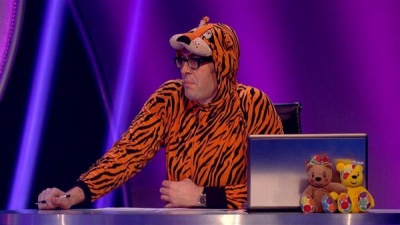 If you enjoyed this picture of Richard Osman in a tiger onesie, do give at www.bbc.co.uk/pudsey
If you enjoyed this picture of Richard Osman in a tiger onesie, do give at www.bbc.co.uk/pudsey
Mastermind was back up against the football this week, and avoided the puns about it being a bit Adrian Chile out. It was also against Children in Need, so didn't need to wheel out quite such big guns. Nevertheless, the quality of specialist play surprised us.
- Russell Clements (Novels of Jonathan Coe) scored on "The Rotters Club", and on a satnav system that is taking on a mind of its own. At least it doesn't remind us to call the vet. The only player to pass in the opening round scored 9 (3); his general knowledge round was a little less fruitful, finishing with 16 (8).
- Andrew Craig (Military Aircraft of World War One) got to use terms we wouldn't normally hear before the watershed, like "Fokker". 11 (0) is enhanced by knowledge of Sherlock Holmes' brother and former question-setter for Brain of Britain; it's not enhanced by knowledge of the Calder valley, a lovely part of the world with wonderful people. A few other questions slip, and then some more, but a good recovery sees him finish on 25 (0). And no passes.
- John Abernethy (The Pogues) answered questions about the "Fiesta" hitmakers, and was surprised to find his guess that Ade Edmondson had directed the song's video. 12 (0) is followed by a pass on a very early question; the contender also goes on to confuse Top Gear with Robot Wars. An easy mistake, they were both cancelled and turned up on that retirement home for discarded formats, Channel 5. Another round that falls away towards the end, closing on 21 (5).
- James Lockwood (Sir Edward Carson) won no points for turning up in a very smart suit and tie, and many points for answering questions about the Irish solicitor. 12 (0). In his first question, the contender is handed a P45, and he quickly gives a pass, then confuses Katie Price with Kate Moss. One is a model of clothes with a dubious celebrity boyfriend, the other is a model of no clothes with a dubious celebrity boyfriend. Glad we've cleared that up. Back at the game, the contender has picked up a bit of speed, and takes a guess at the final question. He's right, and after reading out the list of passes, Humpo confirms he finished on 25 (5).
So Andrew Craig's no-pass policy has won the day. He'll be back in the next round, next year. No Mastermind next week, we're all going to be treated to the traditional Welsh Friday night: a live game of rugby.
BARB ratings for the week to 3 November tell us that Strictly Come Dancing remained number one, 11.1m saw the performances on Saturday. The X Factor brought 7.9m for its results show, figures that must be causing some consternation at X Fac HQ. HIGNFY continues to pull in great figures on Friday, 5.15m this week. With the Bake Off baked off, University Challenge resumes its place at the top of BBC2's rankings with a usual 3.1m; Bake Off had 2.75m in repeats, and there were 2.4m for Strictly on Two. UC is roughly level with The Chase – 3.15m for a weekday edition, 3.05m for the celebrity version.
Elsewhere, Celebrity Juice storms past 2m with its Hallowe'en special – a good night for ITV2, as Release the Hounds dragged 575,000 straight afterwards. Come Dine on Channel 4 had 1.6m (525,000 on More4), Only Connect on BBC4 pulled 900,000, and there were 470,000 for Swashbuckle on Cbeebies. Concerned faces in west London, as SKY's UK Living channel has yet another flop on its hands: ultra-expensive modelling show The Face has just 185,000 viewers, and is being easily eclipsed by Masterchef Australia on Watch (300,000).
If it's mid-November, it must be time for Ant and Dec to cut the ribbon and declare I'm a Celebrity open (ITV, 9pm Sunday). That's assuming play isn't cancelled due to hail. Earlier on Sunday, the Challenge channel shows off what it won in the Tat Raffle (British Par 3 Championship, UK's Strongest Man), and we're interested to see that Bear Grylls has an imported show on Discovery, Get Out Alive (9pm Monday). More on that story later. It's another chance to see the Dr Who Pointless special next Saturday, while The Chase has Vic Reeves, Michael Buerk, and BGT finalist Francine Lewis.
To have Weaver's Week emailed to you on publication day, receive our exclusive TV roundup of the game shows in the week ahead, and chat to other ukgameshows.com readers, sign up to our Yahoo! Group.

